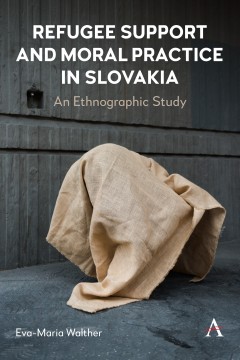Refugee Support and Moral Practice in Slovakia
An Ethnographic Study
By Eva-Maria Walther
Anthem Series on Russian, East European and Eurasian Studies
Other Formats Available:
- About This Book
- Reviews
- Author Information
- Series
- Table of Contents
- Links
- Podcasts
About This Book
Slovakia has never been a major destination for refugees or migrants and follows a strictly anti-refugee politics. Like other formerly socialist countries in Central Europe which are now EU member states—especially its fellow Visegrád countries Poland, Hungary, and the Czech Republic—Slovakia fiercely rejected refugee redistribution during the “long summer of ’migration” in 2015–2016. Meanwhile, the few refugees living in Slovakia face restrictive authorities and deficient support infrastructures. Building on ten months of ethnographic fieldwork carried out between 2017 and 2019 and focusing on those often-overlooked actors who do support refugees as NGO employees or volunteers, this book provides an empathetic and ethnographically rich account of their everyday efforts to accommodate ’refugees’ needs and state ’authorities’ expectations.
The book explores those engagements not as negotiation of political or ideological positions, but primarily as emotional and moral practices. It argues that moral codes and emotional templates shape the implementation of refugee support, structuring encounters and clashes between refugees, helpers, and bureaucrats. They generate lasting formal or informal solutions and even inform new policies in refugee care. Closely connected to this observation is a second finding, namely, that moral dilemmas and conflicting emotions often cause more distress and greater complications than the political controversies surrounding the topic. Actors on opposite ends of the political spectrum—like liberal NGO employees and state bureaucrats—experience the same conflicts of conscience and adopt the same indecisiveness.
These findings challenge the common characterization of the Slovak and other post-socialist societies as being divided between hegemonic populist, illiberal and xenophobic forces on one hand, and a much smaller and less influential liberal and cosmopolitan discourse on the other. Rather, actors blur or adapt their visions of what migration policy should ideally look like while engaging in the complicated practice of refugee care. The dynamics described in this book can increasingly be observed in western European countries as well, as mainstream political and public discourse has become more hostile towards refugees and the utterances from opponents and proponents of refugee solidarity have grown more alike since 2015.
Reviews
“Refugee Support and Moral Practice in Slovakia depicts the perseverance albeit imperfection of refugee support. Non-state actors work within informality and improvisation in regular collaboration but also disobedience toward the state and hostile policies. This ethnography is very timely given the broader rise in nativism and right-wing extremism in contemporary Europe.” — Katerina Rozakou, Assistant Professor of Social Anthropology, Panteion University of Social and Political Sciences, Athens
“Walther delves deeply into the dynamics and moral dilemmas of activists’ care for refugees, concentrating on Slovakia. This vivid ethnographic account of blurred boundaries between state and non-state practices offers a welcome addition to scholarship on Western Europe that contributes original insights to current debates, raising new questions on populism and moralities.” — Tatjana Thelen, Professor of Social and Cultural Anthropology, University of Vienna
“Eva-Maria Walther’s insightful exploration offers findings that challenge the black-and-white portrayal of Slovakia. Rather than a dichotomy of morally defined camps, her research unveils a complex tapestry of societal dynamics. Through her analysis, Walther carefully shows Slovakia’s position, untainted by colonial ventures, yet intertwined with the narrative of the oppressed.” — Helena Tužinská, Assistant Professor, Department of Archaeology and Cultural Anthropology, Comenius University, Bratislava
“Eva-Maria Walther offers a compelling and insightful exploration of the complexities of refugee care in Slovakia. She shed light on the emotion and moral challenges faced by NGOs and public authorities supporting asylum seekers, emphasizing the importance of empathy, clear communication, and unified standards to better serve refugees and supporters alike. Essential reading for policymakers and humanitarian workers alike, this book offers practical solutions to enhance efficiency and empathy in refugee care.”—Dr Nicolette Makovicky, Senior Lecturer in Russian and East European Studies, Oxford School of Global and Area Studies, University of Oxford
Author Information
Eva-Maria Walther is a social anthropologist with a focus on migration and refugee studies and Central Eastern Europe.
Series
Anthem Series on Russian, East European and Eurasian Studies
Table of Contents
Acknowledgments; Chapter: 1 Introduction; Chapter: 2 A Deeply Divided Country; Chapter: 3 Moralities and Emotions; Chapter: 4 Formality and Improvisation; Chapter: 5 Acceptance and Adaptation; Chapter 6: Trust and Mistrust; Chapter: 7 Emancipation and Paternalization; Chapter: 8 Conclusion; References; Index
Links
Stay Updated
Information
Latest Tweets



